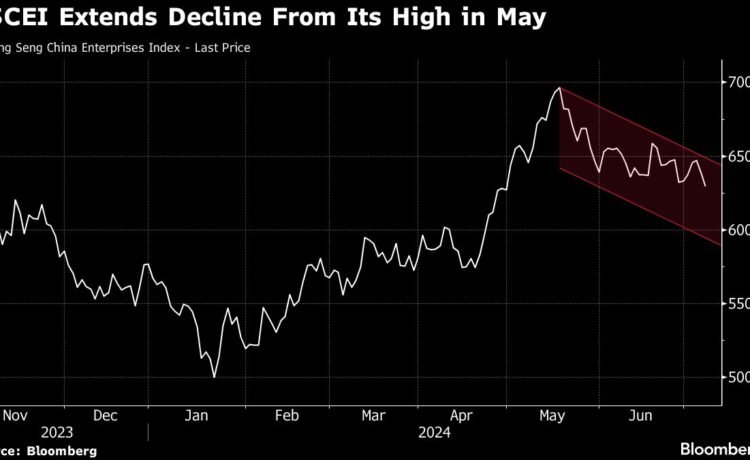(Bloomberg) — Bearish signals are mounting for Chinese stocks ahead of one of the country’s biggest annual policy meetings.
Most Read from Bloomberg
The Hang Seng China Enterprises Index fell as much as 1.9% on Monday, taking its decline from a May 20 high to over 10% and putting it on track for a technical correction. On the mainland, the CSI 300 Index slid for a fifth session. That followed a seventh week of losses on Friday, its longest losing run since early 2012.
A rally in Chinese equities that began earlier this year has lost momentum due to an uneven economic recovery and growing concern over likely geopolitical risks from elections in Europe and the US. Investors don’t expect a quick boost for stocks from the Third Plenum, the July 15-18 meeting that will gather some 400 government bigwigs, military chiefs, provincial bosses and academics in Beijing to steer the country’s political and economic course.
Stimulus so far has had only minimal impact on the nation’s ailing property sector or consumer confidence.
“The Chinese domestic economy remains soft and there’s little expectation for stimulus from the third Plenum,” said Xin-Yao Ng, director of investment at abrdn Asia Ltd. “There is some negative sentiment from the elections in Europe with uncertainties around its attitude toward China with more left-wing parties taking influence.”
Sentiment is particularly fragile among Chinese onshore investors. The CSI 300 index has erased all gains this year, and the Shanghai Stock Exchange Composite Index has been trading below 3,000 points — a key psychological level — since June 21. Small-cap stocks, a segment Goldman Sachs says is particularly vulnerable to slowing economic growth, have been hit particularly hard this year.
Meanwhile, there are signs that the so-called national team may have stepped in recently to boost confidence ahead of the plenum. Some exchange traded funds favored by China’s sovereign wealth fund have seen large inflows since the Shanghai stock gauge fell below the 3,000 level. State funds were crucial in stabilizing the stock market when that index plunged in a February rout.
“Investors are staying on top of macro and policy developments in China but feel no rush to return to the market despite record-low exposure in recent years,” Morgan Stanley strategists including Laura Wang wrote in a note following their recent US marketing trip. “Currency weakness, geopolitical uncertainty, and China’s macro challenges remain near-term hurdles.”
Still, cheap valuations and global funds’ light positioning in Chinese equities create a favorable set up for a rebound if there are positive surprises from the policy meetings and the Federal Reserve’s interest-rate path. About a third of 19 Asia-based strategists and fund managers surveyed informally by Bloomberg News said they see Chinese stocks, together with Indian peers, as likely outperformers in Asia in the second half of the year.
MSCI Inc.’s key gauge of Chinese stocks fell into a technical correction at the end of June, while a Bloomberg Intelligence measure of developer shares has lost more than 30% from its May high. The Hang Seng Tech Index too has entered a correction.
–With assistance from John Cheng.
Most Read from Bloomberg Businessweek
©2024 Bloomberg L.P.















